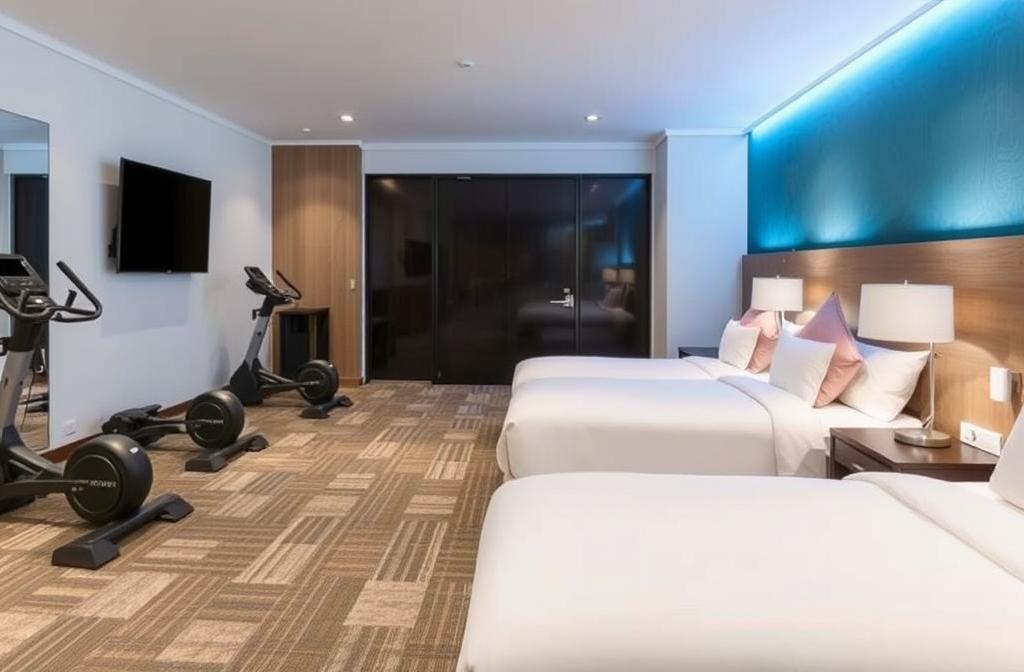The wellness travel industry is thriving, creating a wealth of opportunities for hotels to capitalize on this growing trend. Valued at an estimated $1.7 trillion globally in 2023 (Global Wellness Institute), wellness travel offers a lucrative path to increased revenue. By implementing strategic wellness service improvements, hotels can significantly enhance guest satisfaction, drive occupancy rates, and boost revenue by up to 42% within a year (Emersion Wellness Client Data, 2023).
For those seeking hospitality sales tips to maximize profitability, wellness services are a game-changer. From personalized experiences to data-driven insights, these strategies go beyond traditional spa offerings, transforming hotels into sanctuaries of well-being.
Understanding the Importance of Group Sales in the Hospitality Industry
Group sales refer to the process of selling multiple rooms or services to a single entity, such as corporate groups, wedding parties, tour groups, or event attendees. This approach is a game-changer for the hospitality industry because it ensures bulk bookings, reduces the risk of last-minute cancellations, and creates opportunities for upselling additional services like catering, meeting spaces, or recreational activities.
According to a report by Deloitte, group bookings account for nearly 30% of total hotel revenue in the United States alone. This highlights the immense potential of group sales in driving profitability. Moreover, group bookings often lead to repeat business, as satisfied groups are likely to return for future events or recommend the hotel to others.
How to Sell Hotel Rooms Effectively: The Foundation of Group Sales
Before diving into group sales strategies, it’s essential to master the basics of selling hotel rooms. Here are some key tips:
- Leverage Digital Marketing: In today’s digital age, having a strong online presence is crucial. Use search engine optimization (SEO) to rank higher on search engines for terms like “how to sell hotel rooms” or “best hotels for group bookings.” Invest in paid advertising, social media campaigns, and email marketing to reach a wider audience.
- Highlight Unique Selling Points (USPs): What makes your hotel stand out? Whether it’s a stunning location, state-of-the-art facilities, or exceptional customer service, make sure these features are prominently displayed on your website and marketing materials.
- Offer Competitive Pricing: While luxury hotels can charge premium rates, mid-range and budget hotels should focus on offering value for money. Consider creating packages that include room bookings, meals, and activities at a discounted rate.
- Streamline the Booking Process: A complicated booking process can deter potential guests. Ensure your website is user-friendly, with a seamless booking system that allows guests to reserve rooms in just a few clicks.
By mastering these fundamentals, you’ll create a strong foundation for implementing group sales strategies.
Innovative Group Sales Approaches to Boost Profits
Now that we’ve covered the basics of selling hotel rooms, let’s dive into innovative group sales approaches that can transform your hospitality business:
1. Create Tailored Packages for Different Groups
One size does not fit all when it comes to group bookings. Customize your offerings based on the specific needs of different groups. For example:
- Corporate Groups: Offer meeting rooms, high-speed internet, and catering services.
- Wedding Parties: Provide discounted room blocks, event spaces, and honeymoon suites.
- Tour Groups: Include guided tours, transportation, and local experiences in your packages.
By addressing the unique requirements of each group, you’ll increase the likelihood of securing bookings.
2. Partner with Event Planners and Travel Agencies
Collaborating with event planners and travel agencies can open doors to a steady stream of group bookings. These professionals often work with clients who require accommodations for large groups, making them valuable partners for your hotel. Offer them incentives, such as commissions or exclusive discounts, to encourage them to recommend your property.
3. Use Technology to Simplify Group Bookings
Invest in group booking software that allows event organizers to manage reservations, track payments, and communicate with your team seamlessly. Tools like GroupMAX, Event Temple, or even customized CRM systems can enhance efficiency and improve the overall experience for group leaders.
4. Offer Flexible Cancellation Policies
One of the biggest concerns for group organizers is the risk of cancellations. By offering flexible cancellation policies, you can alleviate their worries and make your hotel a more attractive option. For example, allow free cancellations up to a certain date or offer the option to reschedule without penalties.
5. Upsell Additional Services
Group bookings provide an excellent opportunity to upsell additional services. For instance, if a corporate group books meeting rooms, offer them catering or team-building activities. If a wedding party reserves rooms, suggest spa services or photography packages. These add-ons can significantly increase your revenue per booking.
6. Leverage Social Proof and Testimonials
Positive reviews and testimonials from previous group bookings can build trust and credibility. Showcase these on your website and social media platforms to attract new groups. Consider creating case studies or video testimonials that highlight successful events hosted at your hotel.
7. Host Familiarization (FAM) Trips
Invite event planners, travel agents, and potential group organizers to experience your property firsthand through FAM trips. These complimentary stays allow them to explore your facilities, meet your team, and envision hosting their events at your hotel.
The Role of Data Analytics in Group Sales
Data analytics plays a crucial role in optimizing group sales strategies. By analyzing booking trends, customer preferences, and revenue patterns, you can make informed decisions that drive profitability. For example:
- Identify peak booking periods and adjust pricing accordingly.
- Track the performance of different packages and refine them based on demand.
- Use customer feedback to improve services and address pain points.
Investing in data-driven insights ensures that your group sales strategies remain relevant and effective in a constantly evolving market.
Conclusion: Transforming Your Hospitality Business with Group Sales
In a competitive industry like hospitality, innovation is key to staying ahead. By mastering how to sell hotel rooms and implementing innovative group sales approaches, you can unlock new revenue streams and enhance guest satisfaction. From creating tailored packages to leveraging technology and data analytics, the possibilities are endless.
Remember, the success of your group sales strategy depends on understanding your target audience, delivering exceptional experiences, and continuously adapting to market trends. Start implementing these strategies today, and watch your hospitality business thrive!
Why Security Risk Assessments Matter in the Hospitality Industry
Security is no longer just a behind-the-scenes concern—it’s a key factor influencing guest decisions. According to a 2022 survey by Statista, 78% of travelers consider safety and security when choosing accommodations. Hotels that fail to address security risks not only jeopardize guest safety but also risk damaging their reputation, leading to lost revenue and decreased occupancy rates.
A comprehensive security risk assessment helps identify potential vulnerabilities, from cyber threats to physical safety concerns, and provides a roadmap for mitigating these risks. By proactively addressing security issues, hotels can create a safer environment for guests, reduce liability, and ultimately boost profitability.
The Connection Between Security and Revenue
At first glance, security might seem like a cost center rather than a revenue driver. However, the opposite is true. Effective security measures can directly impact your bottom line in several ways:
- Enhanced Guest Trust and Loyalty: Guests are more likely to return to a hotel where they feel safe. Positive reviews and word-of-mouth recommendations can further boost bookings.
- Reduced Liability Costs: Preventing incidents like theft, accidents, or data breaches can save your hotel from costly lawsuits and insurance claims.
- Competitive Advantage: In a crowded market, highlighting your security measures in hotel advertisements can set you apart from competitors.
- Increased Group Bookings: Corporate clients and event planners prioritize safety when selecting venues, making robust security a selling point for group sales.
By integrating security into your overall business strategy, you can turn it into a revenue-generating asset rather than just an operational necessity.
5 Essential Steps for Conducting Effective Hotel Security Risk Assessments
To maximize revenue and ensure guest safety, follow these five essential steps for conducting a thorough security risk assessment:
1. Identify Potential Risks
The first step is to identify all possible security risks that could impact your hotel. These risks can be categorized into three main areas:
- Physical Security: This includes risks like unauthorized access, theft, fire hazards, and natural disasters.
- Cybersecurity: With the rise of digital bookings and guest data storage, hotels are increasingly vulnerable to cyberattacks, such as data breaches and ransomware.
- Operational Risks: These include employee-related issues, such as internal theft or inadequate training, which can compromise guest safety.
Conduct a walkthrough of your property, review past incidents, and consult with security experts to create a comprehensive list of potential risks.
2. Evaluate the Likelihood and Impact of Each Risk
Not all risks are created equal. Some, like a fire, may have a low likelihood but a high impact, while others, such as theft, may occur more frequently but with less severe consequences. Use a risk matrix to evaluate the likelihood and impact of each identified risk. This will help you prioritize which risks to address first and allocate resources effectively.
For example, if your hotel is located in an area prone to natural disasters, investing in emergency preparedness should be a top priority. On the other hand, if cyberattacks are a growing concern, strengthening your IT infrastructure might take precedence.
3. Develop and Implement Mitigation Strategies
Once you’ve identified and prioritized risks, the next step is to develop strategies to mitigate them. Here are some examples:
- Physical Security: Install surveillance cameras, access control systems, and alarm systems. Train staff to handle emergencies like fires or medical incidents.
- Cybersecurity: Use encryption for guest data, conduct regular software updates, and educate employees on recognizing phishing attempts.
- Operational Risks: Implement background checks for new hires, establish clear protocols for handling guest complaints, and provide ongoing staff training.
Remember, mitigation strategies should be tailored to your hotel’s specific needs and risks.
4. Monitor and Review Security Measures Regularly
Security is not a one-time effort—it requires continuous monitoring and improvement. Schedule regular reviews of your security measures to ensure they remain effective and up-to-date. This includes:
- Conducting periodic risk assessments to identify new threats.
- Testing emergency response plans through drills and simulations.
- Gathering feedback from guests and staff to identify areas for improvement.
By staying proactive, you can address potential issues before they escalate into major problems.
Also Read: Unveiling the Secrets: A Comprehensive Guide to Resort Weight Loss Program Pricing
5. Communicate Your Commitment to Safety in Hotel Advertisements
Once you’ve implemented robust security measures, it’s time to let the world know. Incorporate your commitment to safety into your hotel advertisement campaigns to attract safety-conscious travelers. Highlight features like 24/7 security, surveillance systems, and emergency response protocols on your website, social media, and booking platforms.
For example, you could create a video tour showcasing your security measures or include testimonials from guests who felt safe during their stay. By transparently communicating your efforts, you can build trust and differentiate your hotel in a competitive market.
The Role of Technology in Enhancing Hotel Security
Technology plays a pivotal role in modern hotel security. From advanced surveillance systems to AI-powered analytics, innovative tools can help you stay ahead of potential risks. Here are some technologies to consider:
- Smart Locks: These allow guests to access their rooms using mobile apps, reducing the risk of lost keys or unauthorized access.
- AI Surveillance: AI-powered cameras can detect unusual behavior, such as loitering or unattended bags, and alert security personnel in real-time.
- Cybersecurity Software: Protect guest data with firewalls, antivirus programs, and intrusion detection systems.
Investing in these technologies not only enhances security but also positions your hotel as a forward-thinking, guest-centric property.
Case Study: How a Luxury Hotel Boosted Revenue Through Security Investments
A luxury hotel in New York City faced declining bookings due to safety concerns in the surrounding area. To address this, the hotel conducted a comprehensive security risk assessment and implemented several measures, including:
- Installing state-of-the-art surveillance cameras and access control systems.
- Partnering with local law enforcement to increase patrols in the area.
- Launching a hotel advertisement campaign highlighting their enhanced security features.
Within six months, the hotel saw a 20% increase in bookings and a significant improvement in guest satisfaction scores. This case study demonstrates how prioritizing security can directly impact revenue and reputation.
Conclusion: Turning Security into a Revenue Driver
In the hospitality industry, security is more than just a necessity—it’s a competitive advantage. By conducting effective security risk assessments and implementing robust measures, hotels can protect their guests, reduce liability, and boost revenue. From identifying risks to leveraging technology and communicating your efforts through hotel advertisements, every step plays a crucial role in building a safer, more profitable business.
Remember, guests today value safety as much as comfort and luxury. By prioritizing security, you can create a welcoming environment that attracts more bookings, fosters loyalty, and sets your hotel apart from the competition. Start your security risk assessment today and unlock the full potential of your hospitality business!










